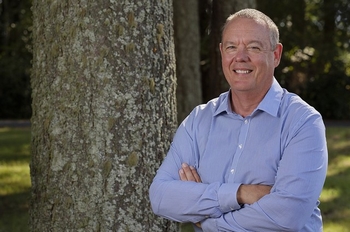Building back better with a biopilot boost

If companies had Christmas wishes, top of Scion’s wish list would be tangible support for a National Bioproduct Innovation and Pilot Centre. As readers of my editorials will know, I have long advocated for such a biopilot facility.
Scion’s mission is to drive innovation and growth in the forestry and bioproducts sectors. Achieving this is hampered by a missing critical piece of infrastructure - a biopilot plant. Why is this so important? A biopilot plant in New Zealand is vital to locking in the scaleable innovation these sectors need to help tackle climate change and ultimately benefit our country.
Such infrastructure fits into the Government’s big picture around the mission for New Zealand to ‘build back better’.
With the world moving increasingly towards a circular bioeconomy, New Zealand faces one of the largest opportunities ever to build a better future. We estimate this opportunity to be $30 billion per annum in 10 years.
The traditional petrochemical and fossil fuel economy has never afforded New Zealand real natural competitive advantage. However, in this promising new future world, our country has significant advantages: our clean green image, our ability to be among the world’s most efficient and sustainable growers in forestry, agriculture and horticulture, our strong expertise in science and applied science in these areas and our partnership approach to heed a Te Ao Māori world view.
A sure way to tap into this circular bioeconomy opportunity is to provide a biopilot bridge between science and commercial operations. Biopilot plants contain specialised equipment beyond lab scale to test and de-risk new product innovations and work out how to scale up new products to commercially viable levels. Biopilot plants operate as open-access research and demonstration facilities enabling new and existing businesses to advance, prove, scale-up and decrease financial risk for innovative products.
A national biopilot plant’s key value is the multiplier effect it will have by unlocking new biobased manufacturing opportunities and jobs for forestry and manufacturing in New Zealand. Establishing this scale up facility will bring initial jobs in construction and operation, while the investment will continue to pay off long into the future as it moves forestry and other regional agricultural biomass resources up the value chain with new products, new companies and new jobs. Based on international examples, a biopilot plant could create over 10,000 new jobs and increase the original value of the log or waste stream by up to 1000 times.
Around the world, biopilot plants are necessary scale-up infrastructure, well and truly accepted as essential to get science and technology adopted by industry, new businesses and investors. It’s time leaders in New Zealand take note and look to investing in providing this bridge to bringing innovative products to market.
I am heartened by the support Scion has received from 37 high-profile companies and organisations who were signatories to a Scion proposal for a National Bioproduct Innovation and Pilot Centre at Te Papa Tipu Innovation Park in Rotorua. That’s the first step.
If you believe that New Zealand needs to have a biopilot plant as a national asset that will grow a whole new primary industry, please let me know.
Meri Kirihimete

Dr Julian Elder
Chief Executive
For further information contact
Dr Julian Elder
